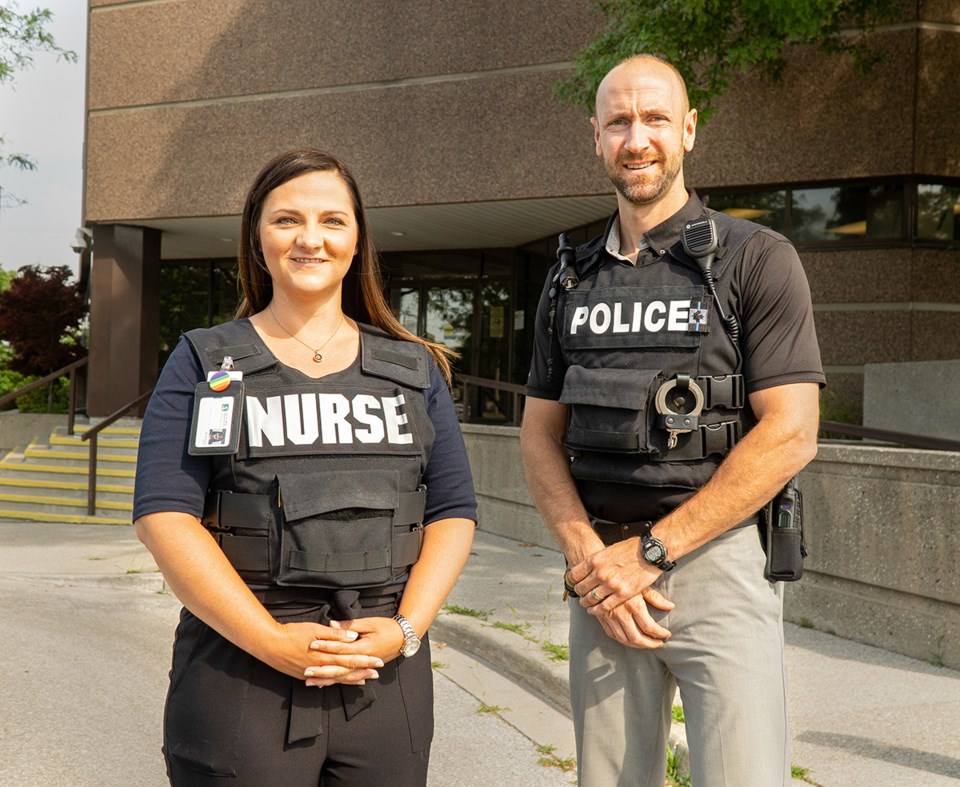Troy Shantz
Leading a handcuffed person in serious mental distress through the hospital emergency department isn’t something police officers enjoy, says Const. Tim VanCowenberg.
Which is why many have welcomed a pilot program underway in Sarnia in which a mental health team is deployed to de-escalate high-pressure situations and aid people in crisis.
“You can almost see the relief on the officer’s face sometimes when we’re able to come and assist,” said VanCowenberg, a nine-year veteran of the city force.
Sarnia’s Mental Health Engagement and Response Team, or MHEART, is compromised of VanCowenberg and Nicole Polak, a registered nurse with the Canadian Mental Health Association.
A similar team in Lambton County works through the OPP.
During four, eight-hour shifts each week Polak and VanCowenberg respond to active situations as needed and conduct follow-ups with at-risk individuals already known to police.
They drive an unmarked vehicle and wear street clothes with a bulletproof vest. Polak’s reads “NURSE” in bold letters.
A standard police uniform can be a negative trigger, she said.
“For them to de-escalate they need to believe that you’re there to help, that you’re not there to arrest them, that they’re not in trouble.”
Mental health is central to renewed demands to “defund” or restructure police departments, because police-involved deaths in Canada often involve mental health and substance abuse.
VanCowenberg, a Sarnia police hostage negotiator, said putting trained mental health professionals on the front line should become standard practice.
“You’d have to live under a rock not to know kind of what’s going on with regard to police reform. And I think the public is speaking out.”
Polak said growing demands placed on police departments has forced officers to wear too many hats, doing jobs for which they might not be fully trained.
“I saw this type of program building in other communities and I had voiced to my (CMHA) management that we need this here,” she said.
Mornings begin with a review of the previous night’s cases, with night shift officers flagging incidents with an obvious mental health factor.
They conduct follow-up visits, communicate with health-care providers, and respond to 911 calls when needed. The team can also be dispatched by mental health physicians, Bluewater Health, and CMHA.
In the event someone does need to be taken to hospital it’s done discreetly, Polak said.
“The whole goal is to help this person, not to make it worse for them, not to traumatize them,” she said.
“We want to help people maintain their dignity as much as they can.”
Ontario Deputy Premier and Health Minister Christine Elliott announced the two local mobile crisis intervention teams during a visit to Sarnia last August.
Their rollout coincided with a new police-hospital transition framework designed to help patients in crisis get timely care.
The result: far fewer people taken to hospital in crisis and a higher admission rate and treatment for those who are, VanCowenberg said.
“What’s great about our program is that we’re able to kind of calm the situation down and conduct the same (hospital) assessment in the comfort of that person’s home.”
The team might arrive at a scene aware of a person’s medical history or previous run-ins with police, Polak said. In one recent example, they knew that the person in crisis had missed several appointments and a prescription drug injection.
“Knowing that going in … helps us handle the situation,” she said.
Eleven months in, the program is still in the pilot stage. But Polak said it’s already clear more mental health teams are needed.
“We’ve already met the threshold,” she said. “Yes, this needs to continue. The people we’re dealing with can definitely benefit from programs like ours.”
